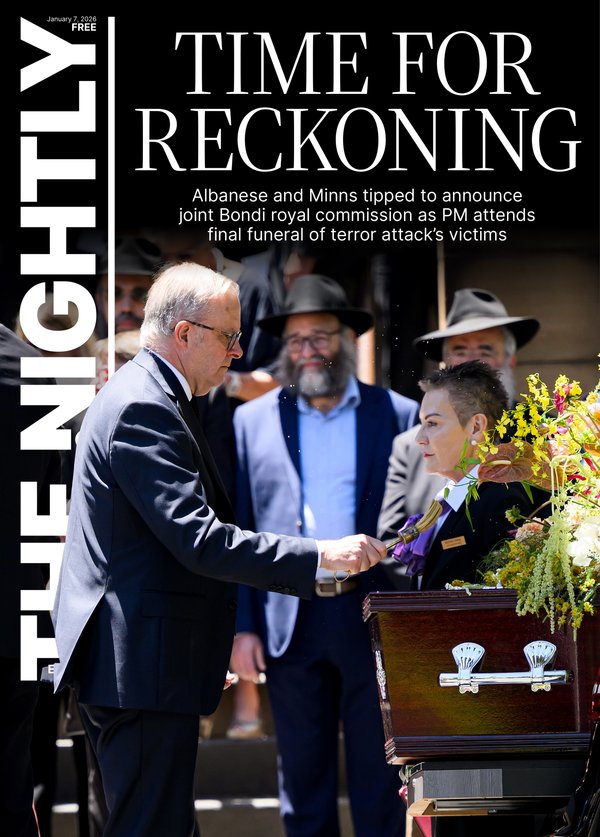SIMON BIRMINGHAM: We must appreciate peace, our most precious and fragile commodity

Appreciate peace.
They were the words of Hanna, a Ukrainian mum, who has had to flee her home with her children Sofia and Artem due to Russia’s ongoing attack in Donetsk.
Hanna was one of many displaced people I met this week at services provided by the Ukrainian charity Save Ukraine, a local delivery partner of World Vision.
Sign up to The Nightly's newsletters.
Get the first look at the digital newspaper, curated daily stories and breaking headlines delivered to your inbox.
By continuing you agree to our Terms and Privacy Policy.I asked Hanna what message she wanted me to take away from Ukraine to relay back to Australia. Instead of asking for more help, she offered the most poignant of advice: to value what we have, which she does not.
Having left homes, loved ones and their lives behind, or destroyed, Hanna and many others I met are receiving temporary shelter, health care and basic schooling for their children.
The schooling matters most to Ivanna. A mum of five boys who, after two years of COVID-induced closures, followed by subsequent war-induced closures, haven’t been to school in four years.
Vlodomir is a single parent whose wife died in childbirth. His son, Evhen, has severe cerebral palsy. Life was challenging enough, without war tearing them away from all that they knew.
Yet he is grateful and even considers himself lucky. The services funded by World Vision have created some dedicated accommodation for families with children living with disabilities. They can’t stay forever, but it’s something while they work out what comes next.
An estimated 238,000 people died in war and conflict around the world last year.
Some you have definitely heard of. Russia-Ukraine, obviously. Hamas-Israel, almost certainly.
Other major conflicts where more than 10,000 people are estimated to have died last year include those in Myanmar, the Maghreb region of North Africa, and Sudan.
Civil war also continues in Somalia, Yemen, Ethiopia and Syria, alongside conflict in Nigeria and the Congo. Drug, cartel and gang wars kill thousands annually in Mexico, Colombia and Haiti.
Natural disasters add to this toll. UNICEF reports responding to 412 emergencies in 107 countries last year.
But death is final. And for each of these deaths there are so many more injured, scarred and left truly homeless.
At the end of 2023, the United Nations High Commissioner for Refugees estimated 117 million people were forcibly displaced from their homes due to conflict, violence and persecution.
The statistics can and should shock. That’s more than four times the population of Australia. Bigger than the entire populations of the United Kingdom, Germany, Türkiye or Vietnam. Bigger, in fact, than all but the world’s 12 most populous countries.
But behind the statistics are real people, like Hanna, Ivanna and Vlodomir. Real children who should have hopes for the future, but instead have a daily struggle for survival and an accumulation of deep psychological scars.
Often their only or best hope are humanitarian or aid workers. Whether they are on the side of right or wrong, governments at war are usually too stretched, too distracted, too broke or too dysfunctional to provide all of the help needed.
These people often put the lives of others before their own. Think of Zomi Frankcom, the 43-year-old Australian woman who was one of seven World Central Kitchen workers killed in a tragic mistake made by Israeli forces in Gaza.
Whatever the politics of these conflicts, the selflessness and humanitarianism of individuals like Zomi is true heroism in action. They save lives, help the survivors and sometimes create a future where there was none.
Just as we should more often spare a thought for the many who are much less fortunate than we in Australia, we should also be grateful for those who offer the help that no one else will.
Australia cannot solve the wars and conflicts of other nations.
We may have one of the most generous permanent resettlement programs in the world. But we cannot resettle all or even a significant fraction of the 177 million people driven from their homes by war.
We can and should continue to help as a country, through our aid program. We should do so as individuals, through donations to organisations like World Vision. But we can never fund all of the services required to put all of these lives back on track.
So we should appreciate peace. We should invest in the defences and diplomacy to preserve it. And we should give thanks to those who empower someone like Hanna to give us all such sage advice.
Simon Birmingham is the shadow foreign affairs minister
